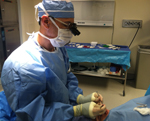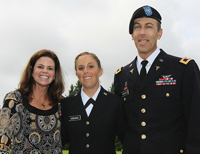|
by Cindy Abole
Public Relations
Three months ago,
ophthalmologist Andrew Eiseman's days were
full and his weeks were long while working
as an oculoplastic surgeon. He performed
complex eye reconstruction procedures for
injured soldiers evacuated from
battlefields in Iraq and Afghanistan. He
also provided sight-saving consults to
medical teams in field hospitals and
remote facilities thousands of miles away
using the most modern telemedicine
techniques to support telesurgery and
other technologies.
For 15 years, Eiseman
was chief of the ophthalmic plastic and
reconstructive surgery services at Walter
Reed Army Medical Center in Washington,
D.C., providing care to soldiers Marines,
sailors and airman. For his final year, he
was the chief of the newly formed
ophthalmology service at the Walter Reed
National Military Medical Center in
Bethesda, Md., after Walter Reed and
Bethesda Naval Hospital combined
facilities in 2011.
Today, Eiseman has
learned to translate his knowledge and
trauma care experience to improving the
eye health of his civilian patients at
Storm Eye Institute (SEI). A decorated
career military man, Eiseman retired from
the U.S. Army as a colonel in October
after 26 years of active duty service and
became an associate professor of
ophthalmology at MUSC in September.
 Storm Eye
Institute's Dr. Andrew Eiseman is an
oculoplastic surgeon who will help
expand MUSC's Ocular Surgical Service. Storm Eye
Institute's Dr. Andrew Eiseman is an
oculoplastic surgeon who will help
expand MUSC's Ocular Surgical Service.
For Eiseman, his
retirement and move to South Carolina is a
homecoming of sorts. Earlier in his
career, Eiseman and his family were
stationed in Augusta, Ga. and enjoyed
their time in the South. When he began
planning for the second stage of his
career, Eiseman considered the challenge
of establishing a private specialty
practice, but saw the opportunities at
MUSC and SEI.
"I'm very proud to be
here and to have the chance to share my
expertise with patients and staff at Storm
Eye. I feel comfortable taking care of
patients from throughout the state for
ocular trauma care due to injury but also
provide other reconstructive and cosmetic
surgeries as well," said Eiseman, who is a
1986 graduate of the U.S. Military Academy
in West Point. He went on to earn his
medical degree in the Uniformed Services
University of the Health Sciences in 1990
and later completed a fellowship in
ophthalmic plastic and reconstructive
surgery at the Wills Eye Hospital in
Philadelphia.
At Walter Reed, Eiseman
was prepared to conduct the most complex
repairs and ophthalmologic reconstructions
that would often involve the collaboration
of neurosurgeons, otolaryngologists and
other specialists. At SEI, he may not
treat patients for injuries from bomb
blasts, but he is prepared to care for
patients suffering from other trauma that
affects the eye. In addition to trauma,
Eiseman can provide people with eyelid
repairs after tumor removal, brow and lid
lifts, wrinkle reduction using Botox and
chemical peels.
"SEI provides a full
spectrum of ophthalmic plastic surgery
from reconstruction and cosmetic needs.
Our Ocular Surgical Service is prepared to
care for patients and their needs
throughout the span of their lifetime,"
Eiseman said.
Although Eiseman was
never deployed to the war front, his
ocular surgical knowledge and trauma
experience were best served closer to
home. According to Eiseman, about 85
percent of all injured soldiers stationed
in Iraq and Afghanistan are medically
evacuated to Walter Reed hospital. The
military's evacuation chain for injured
soldiers triaged them first for emergency
surgery in Iraq or Afghanistan before
being transported to Landstuhl Regional
Medical Center in Germany.
Next, patients would be
sent for further medical treatment at
either Walter Reed or Brooke Army Medical
Center in Houston, Texas.
 Army Col. Andrew
Eiseman with wife Amy, and daughter 2nd
Lt. Allison. The Eisemans also have a
son, Mark. Army Col. Andrew
Eiseman with wife Amy, and daughter 2nd
Lt. Allison. The Eisemans also have a
son, Mark.
According to Eiseman,
the percentage of ocular injuries
sustained by U.S. soldiers in combat has
risen sharply compared to total war
injuries. During the Gulf War, ocular
injuries accounted for 13 percent of total
injuries compared to Vietnam (7 percent)
and World War II (2 percent).
In addition to
providing ophthalmic plastic and
reconstructive surgery and treatment of
complex orbital diseases,
Eiseman will continue
his research interests in lacrimal
drainage system abnormalities, ocular
trauma and telemedicine evaluation of
eyelid lesions. He also is primary
instructor of SEI's ophthalmology
residents in oculoplastics and orbital
disease management.
Friday, Nov.
9, 2012
|



 Storm Eye
Institute's Dr. Andrew Eiseman is an
oculoplastic surgeon who will help
expand MUSC's Ocular Surgical Service.
Storm Eye
Institute's Dr. Andrew Eiseman is an
oculoplastic surgeon who will help
expand MUSC's Ocular Surgical Service. Army Col. Andrew
Eiseman with wife Amy, and daughter 2nd
Lt. Allison. The Eisemans also have a
son, Mark.
Army Col. Andrew
Eiseman with wife Amy, and daughter 2nd
Lt. Allison. The Eisemans also have a
son, Mark.